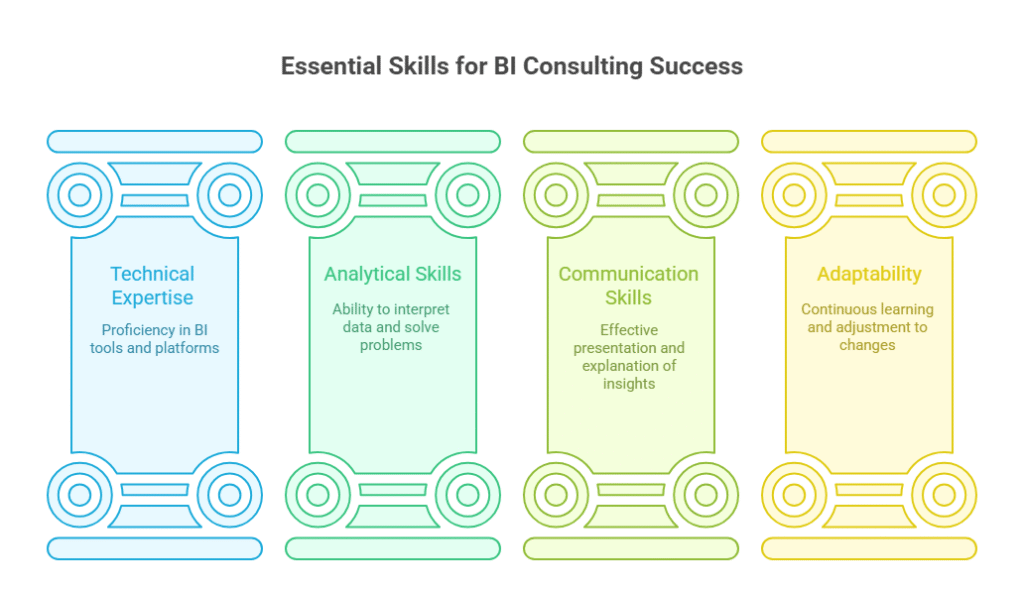
Business intelligence (BI) has real weight in how companies operate. It draws the line between flying blind and making decisions that lead to real outcomes.
And that difference? It’s built by people: consultants who know how to turn incomplete data into strategies that actually work.
That’s why business intelligence consulting is one of the most promising career paths in today’s data-driven world. And it’s growing fast.
If you’re wondering how to launch a career in business intelligence consulting, you’re not alone. The demand is rising, and companies across industries are actively looking for professionals who can turn raw data into smart action.
Here’s just one fact to set the scene: only 3% of companies’ data meets basic quality standards. That means 97% of the data businesses rely on is flawed, fragmented, or useless unless someone steps in to fix it.
Someone like you.
And the best part? You don’t need a decade of experience to get started. But you do need the right strategy. In this guide, you’ll find exactly that.
Let’s break it down.
- TL;DR
- Why a Career in BI Consulting Is Worth It?
- What Business Intelligence Consultants Actually Do
- Skills You Need to Succeed in BI Consulting
- Education and Certifications That Give You an Edge
- How to Launch Your BI Consulting Career: 5 Key Steps
- Common Career Paths in Business Intelligence Consulting
- Tips for Standing Out in the BI Consulting Job Market
- Ready to Launch Your BI Consulting Career?
- FAQs
TL;DR
Short on time? Here’s the quick version of what matters:
- Business intelligence consultants turn complex data into a real business strategy.
- Demand is growing across industries like healthcare, retail, and manufacturing.
- The role combines analytics, business insight, and tech tools.
- You’ll need both technical and communication skills to stand out.
- Certifications help, but hands-on experience is even better.
- Entry-level roles like data analyst or junior consultant are great launchpads.
- Long-term growth options include freelance work, firm-based consulting, or in-house roles.
Why a Career in BI Consulting Is Worth It?
Business intelligence consulting hits a sweet spot that few careers can offer: high impact, strong demand, and flexibility.
If you’re someone who enjoys solving complex problems and making data useful for real decisions, this path is worth serious consideration. Let’s see why:
A Field Driven by Data and Strategy
BI consulting isn’t locked into one area. You sit right where analytics, business, and tech intersect, and that opens doors.
You’re not buried in code, but you do work with data. And beyond reporting numbers, you’re guiding strategy.
That’s exactly what companies need right now. Around 68% of business leaders believe BI gives them a competitive edge. The challenge here? Knowing what to do with data..
BI consultants are the translators. They take massive data sets and extract what actually matters for growth, operations, and strategy.
Strong Job Growth and Demand
BI roles aren’t just popping up in tech companies. Healthcare, manufacturing, retail, logistics… virtually every industry is investing in smarter decision-making.
There’s a notable shift toward specialized BI talent. Small and medium-sized businesses now account for more than 41% of new BI consulting demand. They’re looking for industry-focused consultants who get their specific challenges.
Key Stat: The compensation reflects that demand. In the U.S., top BI consultants can earn over $130,000 per year.
Impact and Career Flexibility
One of the biggest perks of this career? Range.
You can work in-house for a large company. Join a consulting firm and support multiple clients. Or build a solo practice and go freelance.
Whatever you choose, your work has a visible impact. A new dashboard you implement might reduce waste across an entire department. A data model you build could help a hospital cut appointment no-shows by 30%.
That kind of influence builds long-term career value.
Get Started as a BI CONSULTANT – A Simple Guide!
What Business Intelligence Consultants Actually Do
Let’s get specific. If you’re going to launch a career in BI consulting, you need to know what the day-to-day looks like.
Here’s how that breaks down in practice:
Translate Data Into Business Insight
This is the heart of the job. You work with clients to understand their goals, then dig into their data to find answers.
It’s part detective, part strategist. You’re analyzing performance, identifying patterns, and turning all of that into a story leaders can act on.
BI Solution Design and Implementation
Once you’ve identified the problems, you help build the tools that solve them. That might mean setting up dashboards, automating reports, or designing workflows that surface insights in real time.
You don’t have to be a developer, but you do need to understand how data flows through the tools your client uses.
Advisory on Strategy and Performance
The best BI consultants don’t just hand over a report and walk away.
They help companies define success metrics, track performance, and continuously refine their processes. You might run strategy workshops, lead stakeholder meetings, or recommend changes based on your data analysis.
It’s a hands-on role that shapes how companies move.
What Does A BI Consultant Do? | Business Intelligence for Beginners
Skills You Need to Succeed in BI Consulting
You don’t need to be a data scientist to succeed in BI consulting, but you do need a strong mix of technical, analytical, and communication skills.
That mix is what turns you from “report builder” into a trusted advisor. You can work with raw data, make sense of it, and explain what it means in clear language.
Here are the core skills that matter:

Technical Expertise in BI Tools
First, the basics. If you want to work in BI consulting, you’ll need to get comfortable with tools like:
- Power BI and Tableau for dashboards and data visualization.
- SQL for data extraction and querying.
- Python for deeper analysis and automation.
- Cloud platforms like Snowflake, AWS, or Azure.
The numbers tell a clear story: among the top-listed BI consultant skills, dashboards (12.2%), Power BI (8.3%), analytics (7.5%), and SQL Server (6.9%) show up the most often in resumes.
In simple terms, companies want consultants who can work with data and also build the structures that support reporting and analysis.
You don’t need to master every tool in the market. Pick a core stack, use it in real projects, and build depth there.
Strong Analytical and Problem-Solving Skills
BI consultants are problem solvers first. You’re not just looking at numbers for the sake of it. Actually, you are spotting patterns, diagnosing issues, and finding practical paths forward.
That requires curiosity, business awareness, and the ability to connect data with real operations.
Business and Communication Skills
Great analytics lose value if no one understands the message.
You’ll need to present findings clearly, explain the “why” behind trends, and help decision-makers see what needs to change. Many of the people you work with will not be technical. Your role is to bridge that gap.
Data storytelling helps here as a simple rule: highlight what matters, strip out noise, and make the next step obvious.
Adaptability and Continuous Learning
BI changes quickly. New tools appear, data volumes grow, and regulations shift.
To stay relevant, you need flexibility. That means testing new tools, updating your skill set, and being ready to adjust your approach for different industries or clients.
People who treat BI as a one-time skill set fall behind. The consultants who keep moving with the field build long-term careers.
Education and Certifications That Give You an Edge
There is no single degree that instantly turns you into a BI consultant. Still, certain academic paths and credentials make the journey smoother and give you an advantage in the job market.
Let’s focus on the ones that help:
Relevant Degrees and Academic Paths
Most BI consultants come from one of these areas:
- Data analytics
- Computer science
- Statistics
- Business or finance
If you have a degree in any of these, you already have a useful foundation. If your background is different, you still have options. Many professionals move into BI after working in operations, finance, marketing, or IT.
What matters is that you can handle data, understand how organizations work, and connect analysis to business outcomes.
Popular Certifications in BI and Analytics
Certifications do not replace experience, but they signal serious intent and help with early opportunities. Some widely recognized options include:
- Microsoft Certified: Data Analyst Associate
- Tableau Desktop Specialist or Certified Associate
- AWS Certified Data Analytics – Specialty
- Google Data Analytics Professional Certificate
These credentials show that you can use specific tools and frameworks that employers already trust.
If you are unsure where to start, check job postings for BI consultant or data analyst roles in your target market. Notice which tools appear again and again, then choose certifications that line up with those.
Online Courses and Bootcamps to Consider
If you want structured training without going back to university, there are strong alternatives:
- DataCamp and Coursera for flexible online programs.
- Springboard or General Assembly for mentor-led or bootcamp-style paths.
- Udemy and LinkedIn Learning for short, tool-focused courses.
Prioritize options that include real projects. You can reuse those projects in your portfolio and show concrete results instead of just listing course names on your resume.
How to Launch Your BI Consulting Career: 5 Key Steps
You don’t need a perfect background to get into BI consulting. What you do need is a plan.
Here’s how to build momentum from zero:

1. Build a Strong Foundation in Data and Analytics
Start with the basics. Pick a BI tool (like Power BI or Tableau) and get hands-on with real data sets.
Practice connecting data sources, building dashboards, and setting up reports. Many platforms offer free versions or public datasets, so you don’t have to wait for a job to start doing the work.
2. Create a Portfolio That Proves Your Expertise
No one wants to read “skilled in Power BI” on your resume. They want to see it. So, build a portfolio that includes:
- Interactive dashboards
- Case studies or breakdowns of data projects
- Before-and-after comparisons showing impact
Pro Tip: Use GitHub, Tableau Public, or your own website to showcase your work. Make it easy for someone to click and understand what you can do.
3. Network Within the BI and Data Community
BI is a small world. Your next opportunity might come from a Slack group, LinkedIn comment, or local meetup.
Look for ways to engage:
- Join data communities like Measure Slack, Locally Optimistic, or DBT Slack.
- Comment on LinkedIn posts from BI leaders or hiring managers.
- Attend virtual events or webinars from Tableau, Microsoft, or Snowflake.
You don’t have to post daily or pretend to be an influencer. Just show up consistently, ask smart questions, and share what you’re working on.
4. Look for Entry-Level Opportunities in Analytics or Consulting
You don’t need to land a “BI consultant” title on day one.
Roles like data analyst, junior BI developer, business analyst, or analytics associate can all give you the experience you need to level up. Focus less on job titles and more on the type of work you’ll be doing.
5. Keep Growing and Specialize Over Time
Once you have a solid base, you can start to specialize. Some consultants focus on finance or supply chain. Others become experts in healthcare, retail, or cloud architecture.
You might branch into roles like BI strategist, data product manager, or even BI architect. In any case, every project gives you more clarity on what type of work you enjoy and where you bring the most value.
Common Career Paths in Business Intelligence Consulting
One of the reasons BI consulting attracts so many professionals is flexibility. You’re not locked into one model.
Depending on your strengths and goals, you can choose from multiple paths:
In-House BI Consultant or Analyst
Large organizations often build internal BI teams. These consultants focus on improving decision-making inside the business.
You’ll work closely with stakeholders in operations, finance, marketing, or executive leadership. The goal is to deliver tools and insights that support day-to-day decisions and long-term planning.
This path gives you stability, a deep understanding of one company’s data, and the chance to make an ongoing impact.
BI Consultant at a Consulting Firm
Here, you support external clients. You might jump between projects across industries, solving different types of data challenges.
Expect a fast pace, tight deadlines, and lots of exposure to new tools and use cases. If you like variety, this path can help you build skills quickly and expand your network.
It also gives you visibility into how different businesses operate, which is hard to get from inside one organization.
Independent BI Consultant or Freelancer
For those who value autonomy, freelancing is a real option once you’ve built a reputation.
You set your rates, choose your clients, and manage your own time. But you’re also responsible for sales, contracts, and delivery.
Many freelancers start part-time while still employed, then transition once they’ve secured consistent demand.
Healthcare Business Intelligence Consultant
Healthcare is one of the fastest-growing sectors in BI consulting, and one of the most impactful.
Consultants in this space work with hospitals, clinics, and healthcare systems to:
- Improve patient outcomes
- Streamline operations
- Track compliance and risk
- Deploy predictive analytics
- Integrate EHR and operational data
And demand is rising fast. The global healthcare BI market is projected to reach $22.81 billion by 2030, growing at a 14.4% CAGR.
Why the surge? Because healthcare providers are under pressure to do more with less, and data is how they do it. For instance, in the U.S., 66% of providers already use predictive analytics to anticipate patient needs, reduce readmissions, and optimize scheduling.
Many healthcare organizations don’t have the internal capacity to build BI systems from scratch. That’s why they turn to specialized firms like Medical Flow to build the systems, run the analytics, and keep everything compliant.
If you’re looking for a space where your BI work directly impacts lives, this is it. Healthcare BI combines technical challenge with human value.
Key Stat: The median salary for healthcare BI roles in the U.S. is $99,864, with top earners reaching $116,000, depending on location and specialization.

Tips for Standing Out in the BI Consulting Job Market
Plenty of people know how to build dashboards. Fewer know how to turn those dashboards into decisions.
If you want to stand out in the BI consulting space, focus on doing the things most candidates skip:
- Show your thinking in public: Share insights from your projects, data breakdowns, or visualizations on LinkedIn or Tableau Public. Visibility builds credibility.
- Make your portfolio outcome-focused: Don’t just show charts; prove impact. Explain how your work improved a process, saved time, or solved a real problem.
- Simplify the message: If a client or hiring manager doesn’t understand your insight, it’s useless. Learn to translate data into clear, actionable takeaways.
- Use real-world data: Employers want to see how you handle messy, incomplete, or multi-source datasets. Skip the perfect tutorials.
- Stay sharp with short projects: Build small dashboards or reports weekly to stay current and show momentum. Post them, share your reasoning, and improve with feedback.
- Be present where BI people are: Join Slack communities, attend virtual meetups, or comment on posts from other consultants. Most gigs come from being top of mind.
- Practice your pitch: When someone asks what you do, you need a sharp, confident answer. Practice telling your story in 15 seconds, without jargon.
Ready to Launch Your BI Consulting Career?
As you can see, business intelligence consulting goes beyond pretty charts. It’s about helping companies think smarter, move faster, and solve the right problems.
If that kind of work speaks to you (and you’re ready to build the skills that matter), this path has plenty to offer.
Interested in this field, but also in healthcare? You’re not alone. Clinics and hospitals increasingly rely on BI to improve care, reduce costs, and stay compliant.
Firms like Medical Flow work on the front lines of that transformation. If you’re exploring ways to apply BI in healthcare, reach out to us. We’re always open to connecting with professionals who want to make healthcare smarter through data.
Your next move doesn’t have to be perfect. It just has to be real.
FAQs
How can I start a career in business intelligence consulting?
Start by working with tools like Power BI or Tableau. Build a small portfolio using real data, then apply for roles like data analyst or business analyst to gain traction. Focus on showing how your work leads to actionable insights, not just pretty visuals.
What educational background is beneficial for a career in business intelligence consulting?
A degree in business, data analytics, statistics, or computer science is helpful. However, real project experience carries just as much weight, especially if it shows how you apply data in real-world scenarios.
What certifications can enhance a career in business intelligence consulting?
Look into certifications like Microsoft Certified: Data Analyst Associate, Tableau Certified Associate, or AWS Data Analytics Specialty. These show you’re ready to support data-driven decisions with the right tools and techniques.
What skills are required to launch a business intelligence consulting career?
You need solid technical skills (dashboards, SQL, cloud), analytical thinking, clear communication, and a strong sense of business context. Understanding data collection and how it ties into reporting and performance tracking is also key.
Which programming languages and tools are essential for business intelligence consultants?
Power BI, Tableau, SQL, and Python are commonly used. Familiarity with Snowflake, AWS, or Azure is also valuable, especially in projects aimed at helping companies improve business operations through better reporting and automation.
How do I find entry-level opportunities in business intelligence consulting?
Target roles like data analyst, BI analyst, or business analyst. These give you direct experience that translates into consulting opportunities, while helping you build the skills needed to work across tools, teams, and industries.

 By
By 





